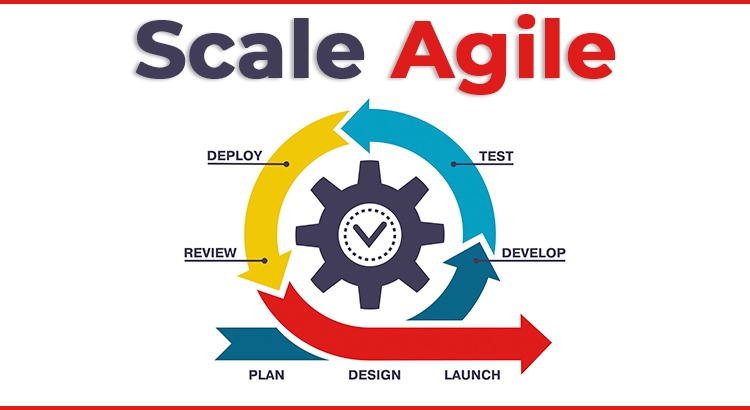Scaling Agile Methodology: Managing Large-Scale Projects

Agile methodology, originally designed for small, cross-functional teams, has revolutionised project management in the software industry. Its iterative and incremental approach enables teams to respond quickly to change and deliver value continuously. However, as organisations undertake larger and more complex projects, scaling Agile becomes essential to maintain its effectiveness while meeting the needs of larger teams and broader scopes.
Understanding Agile at Scale
Scaling Agile involves applying Agile principles and practices across multiple teams, departments, or entire organisations working on interconnected projects. It requires adapting frameworks like Scrum, Kanban, or SAFe (Scaled Agile Framework) to manage the complexities arising from larger project sizes, multiple teams, geographical distribution, and diverse stakeholder requirements.
At its core, scaling Agile aims to preserve the agility and flexibility of small teams while ensuring alignment, coordination, and collaboration across the entire organisation. This approach enables organisations to achieve faster time-to-market, improved quality, and enhanced responsiveness to user feedback, even at scale.
Challenges in Scaling Agile
Scaling Agile presents several challenges that organisations must address to succeed:
- Coordination and Communication- Effective communication and goal alignment across multiple teams are crucial. Poor coordination can lead to duplicated efforts, conflicting priorities, and project delays.
- Dependency Management- Large-scale projects often involve interdependencies between teams or components. Managing these dependencies while maintaining team autonomy is essential to uphold Agile principles.
- Preserving Agile Values- There is a risk of diluting core Agile values like collaboration and flexibility as Agile practices scale. Organizations must find ways to uphold these values while adapting Agile frameworks.
- Cultural Shift- Scaling Agile requires a cultural shift towards transparency, trust, and continuous improvement throughout the organisation. Overcoming traditional hierarchical structures or siloed behaviours can be challenging but is compulsory for Agile success at scale.
Strategies for Scaling Agile Successfully
To overcome these challenges and scale Agile effectively for large projects, organisations can implement the following strategies:
- Scrum of Scrums: Coordination mechanism where representatives from different Scrum teams meet regularly to discuss progress and dependencies.
- SAFe (Scaled Agile Framework): Provides guidance on roles, responsibilities, and processes for scaling Agile across the organisation.
- LeSS (Large-Scale Scrum): Adapts Scrum principles for larger development efforts, emphasising simplicity, transparency, and flexibility.
- Establish Clear Goals and Priorities: Ensure all teams share a common vision and roadmap. Clear alignment on project goals helps teams understand their contributions and enhances overall project success.
- Create Agile Release Trains: Implement time-boxed planning cycles where multiple Agile teams synchronise their work and deliver integrated increments of value at regular intervals. This approach minimises integration issues and fosters collaboration.
- Empower Cross- Functional Teams: Foster collaboration and autonomy among teams from different functional areas. Empowered teams can make faster decisions, adapt to changes efficiently, and deliver value independently.
- Implement Agile Practices: Integrate practices such as continuous integration, continuous delivery, test automation, and DevOps to streamline workflows, improve quality, and accelerate project delivery.
- Focus on Continuous Improvement: Encourage a culture of continuous learning and improvement. Regularly review processes, identify bottlenecks, and implement changes to enhance efficiency and effectiveness.
- Provide Training and Support: Invest in Agile training and coaching for teams, managers, and stakeholders. Ensuring everyone understands Agile principles and practices fosters a collaborative and adaptive environment.
Case Studies and Examples
Several organisations have successfully scaled Agile methodology for large projects:
- Spotify: Utilises the “Spotify Model” to organise teams into “squads,” “tribes,” and “guilds,” promoting innovation and collaboration across the organisation.
- Amazon: Implements Agile practices to manage extensive software development projects globally, focusing on rapid iteration and customer-centricity.
- Microsoft: Adopted SAFe to coordinate Agile teams working on complex software products, ensuring alignment with business goals and customer needs.
Conclusion
Scaling Agile for large-scale projects requires strategic planning, effective communication, and strict adherence to Agile principles. By selecting the appropriate framework, defining clear goals, empowering teams, and fostering continuous improvement, organisations can overcome challenges and harness the benefits of Agile. Agile enables faster delivery, improves team collaboration, and fosters innovation, thereby ensuring overall success and enhancing customer satisfaction.
Additionally, integrating software testing course in Greater Noida, Delhi, Pune and other parts of India is crucial to ensure the quality and reliability of products developed using Agile practices. Providing teams with comprehensive training in software testing methodologies and tools equips them to consistently deliver high-quality software throughout the Agile development lifecycle. This training enhances their ability to detect and resolve issues early, thereby preserving the integrity of Agile processes and significantly boosting customer satisfaction.



